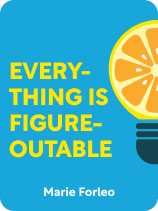

This article is an excerpt from the Shortform book guide to "Everything Is Figureoutable" by Marie Forleo. Shortform has the world's best summaries and analyses of books you should be reading.
Like this article? Sign up for a free trial here.
What is the meaning of “everything is figureoutable?” Why is no problem unfixable?
In Everything Is Figureoutable, Marie Forleo contends that no problem can hold you back in life. It’s a mindset that will help you achieve your goals and your dreams, and sets you on a path of success.
Keep reading to learn more about the “everything is figureoutable” meaning.
Understanding the “Everything is Figureoutable” Philosophy
Forleo explains the “everything is figureoutable” meaning as a mindset with which you can approach every issue in your life. When you believe that things are figureoutable, you believe that you’re capable of solving any problem you face—although you may actively choose not to solve an issue if it isn’t a priority.
You can apply this mindset to all problems in life, even big ones like solving climate change: Even if you don’t solve the full issue in your lifetime, you can make huge progress—the same way that Martin Luther King Jr. didn’t solve racism but made huge strides. Forleo says she learned this philosophy from her mother, who had a fix-it attitude toward everything despite having just a high school education and lacking access to the internet. For example, when Forleo’s mother’s beloved radio broke, she took it upon herself to fix it—and succeeded.
(Shortform note: In The Art of Learning, Joshua Waitzkin suggests a way that you too can instill in your children a sense of confidence that they’re capable of solving any problem they face—even if you don’t model it the way Forleo’s mother did. When you praise your child for succeeding at a difficult task, emphasize the process they went through rather than their innate talents. By doing so, you’ll encourage your child to attribute their success to effort rather than their inborn abilities—and so they’ll grow more likely to persevere when faced with obstacles.)
Forleo clarifies that this philosophy holds true both when you don’t know what to do (like how to fix a radio) and when you face setbacks that seemingly prevent you from achieving your goal. For example, if you’re laid off during a recession, don’t resign yourself to not making any money because you’re convinced nobody is hiring full-time workers. Follow Forleo’s philosophy and look for other ways to make money—such as by searching for freelance opportunities.
(Shortform note: It’s easy to feel defeated when faced with setbacks. In Barking Up the Wrong Tree, Eric Barker notes that one key to persevering is to tell yourself a good story. Your brain naturally tells stories about the random events in your life because doing so gives you a sense of control. These stories are often objectively untrue, as they lead you to ignore information that doesn’t fit into the narrative you’ve created, but they provide with you a sense of meaning that motivates you to surmount obstacles.)
Forleo addresses two common negative reactions to her philosophy. First, you might protest that you can’t solve some issues. But Forleo counters that if something isn’t solvable, it’s not really an issue but a fact—for example, the reality that you can’t lose 100 pounds in one day.
Second, you might refuse to engage with the philosophy, either because you believe it won’t help you or because you’ve already heard it before. To counter this refusal, Forleo recommends that you reframe your objections as questions: Instead of saying, “I’ve heard this before,” or “This can’t help me,” ask yourself, “How can this help me?” Doing so will put you in a more positive, growth-oriented mindset because your brain naturally tries to answer questions.
(Shortform note: You can also counter your objections by adopting a sales technique and asking yourself, “What makes you say that?” In Exactly What to Say, Phil M. Jones explains that this question forces you to justify your objection—which may help you realize that you don’t have a strong argument for your opinion and thus lead you to become more open to Forleo’s philosophy.)
| How Forleo’s Philosophy Compares to Stoicism In some ways, Forleo’s philosophy reflects the ideas espoused by stoicism, a philosophy that stems from ancient Greece. According to The Daily Stoic authors Ryan Holiday and Stephen Hanselman, the Stoics assert that you can control only what you think and not external circumstances. Despite Forleo’s claim that everything is figureoutable, the fact that she recognizes that you can only make progress on some issues rather than fix them—and also recognizes that some problems aren’t solvable because they reflect realities—suggests she would agree with the Stoics’ assertion. Moreover, Forleo’s recommendation to not solve issues that you don’t prioritize reflects the Stoics’ recommendation that we be careful how we spend our time because we only have a limited allotment of it. |

———End of Preview———
Like what you just read? Read the rest of the world's best book summary and analysis of Marie Forleo's "Everything Is Figureoutable" at Shortform.
Here's what you'll find in our full Everything Is Figureoutable summary:
- How to apply the "everything is figureoutable" philosophy to your life
- How you can achieve your dreams and overcome all obstacles
- How to respond when you encounter criticism







Figure out are two words. How can something be figure out able???